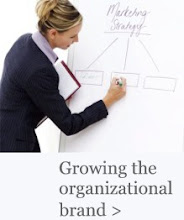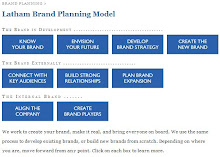Not apology, mea culpa
Yesterday, we watched – actually, all of us took part – in Tiger Woods’s counseling program.
Think about that.
If it’s true, it explains the absence of apology language in Tiger’s remarks. The event wasn’t about apologizing. After all, he made a profound apology in December last year.
It wasn't a press conference, either, which explains the absence of journalists.
Part of his counseling program, we believe Tiger had to admit his errors, confront them, accept them, and acknowledge the impact his behavior had on people who are important to him and who care about him. Except for his wife Elin, those people were in the room yesterday.
So why couldn’t he call his friends and associates individually, or invite them over to his home? A friend in alcohol recovery might call you and say the same things – which has happened to us. Yesterday, Stewart Cink, the PGA professional golfer, said that has also happened to him.
Sadly, a phone call doesn’t get the job done. Tiger is a celebrity as big as the planet. His confrontation and acceptance, inevitably, must be equal to his reality, which is not just enormous, but global.
Which explains the television cameras, the importance of major news coverage, and even the words Tiger used – and probably wrote himself.
All of which puts Tiger’s talk in a different perspective. Clearly, it needed to be as honest, sincere, and authentic as he could make it. It was about his life, his future – and literally, who he is.
In fact, when he said that Elin didn’t need an apology, but will be convinced by his behavior, he meant it.
And in his amazing talk, he included all of us in that statement.
Saturday, February 20, 2010
Friday, February 19, 2010
Tiger's apology
Did it really happen?
The curious thing about Tiger Woods isn’t Tiger, frankly.
It’s all of us.
As golf fans and hero worshippers, we put Tiger on such a pedestal, and he dazzled us brilliantly for so long, that it’s very hard for us to deal with the fact that he is human and does what humans do. He lives his life. He tries to make things work. He runs into headwinds and events – like we all do – that slow us down, steer us off track, and sometimes hurl us into unyielding trees.
Today, Tiger took a step to made amends for what hurt his family and disappointed the people who are important to him.
“For all I have done, I am so sorry,” was Tiger’s headline on the 14-minute speech, delivered in a tightly controlled, closely managed event in the clubhouse at TPC Sawgrass in Ponte Vedra, Florida, championship home of the PGA Tour. That statement came midway through his remarks.
What is interesting about the proceedings is that only three journalists were invited to attend, but had no opportunity to ask questions.
What is interesting about the speech is that the only apology delivered was the parents of children who looked up to Tiger. Very deliberately, his language was about being sorry.
His wife, Elin, Tiger said, did not want a verbal apology. She will wait for his behavior to improve. For her, he told us, his improved behavior will be the best apology.
Nevertheless, in emphasizing that this nationally televised event was not a press conference, Tiger’s management team left dangerous questions dangling in the air.
If it wasn’t a press conference, what was it?
If no apology was offered to his fans, his business partners, and his colleagues on the PGA Tour, was an apology actually made?
“I am sorry” means what it says – I am sorry for what happened. It hurts me deeply. Well, we are sure that is exactly how Tiger feels. And, yes, sorry is an expression of regret. But “I am sorry” is definitively not the same as “I apologize.”
An apology means I am sorry for you, too, and I regret that.
Semantics? Possibly.
There was a lot of emotion in Tiger’s talk, which took courage for him to deliver. He did make an unequivocally powerful commitment to living a different kind of life.
But this was also a carefully scripted event.
Apology language, it seems to us, was carefully scripted out.
The curious thing about Tiger Woods isn’t Tiger, frankly.
It’s all of us.
As golf fans and hero worshippers, we put Tiger on such a pedestal, and he dazzled us brilliantly for so long, that it’s very hard for us to deal with the fact that he is human and does what humans do. He lives his life. He tries to make things work. He runs into headwinds and events – like we all do – that slow us down, steer us off track, and sometimes hurl us into unyielding trees.
Today, Tiger took a step to made amends for what hurt his family and disappointed the people who are important to him.
“For all I have done, I am so sorry,” was Tiger’s headline on the 14-minute speech, delivered in a tightly controlled, closely managed event in the clubhouse at TPC Sawgrass in Ponte Vedra, Florida, championship home of the PGA Tour. That statement came midway through his remarks.
What is interesting about the proceedings is that only three journalists were invited to attend, but had no opportunity to ask questions.
What is interesting about the speech is that the only apology delivered was the parents of children who looked up to Tiger. Very deliberately, his language was about being sorry.
His wife, Elin, Tiger said, did not want a verbal apology. She will wait for his behavior to improve. For her, he told us, his improved behavior will be the best apology.
Nevertheless, in emphasizing that this nationally televised event was not a press conference, Tiger’s management team left dangerous questions dangling in the air.
If it wasn’t a press conference, what was it?
If no apology was offered to his fans, his business partners, and his colleagues on the PGA Tour, was an apology actually made?
“I am sorry” means what it says – I am sorry for what happened. It hurts me deeply. Well, we are sure that is exactly how Tiger feels. And, yes, sorry is an expression of regret. But “I am sorry” is definitively not the same as “I apologize.”
An apology means I am sorry for you, too, and I regret that.
Semantics? Possibly.
There was a lot of emotion in Tiger’s talk, which took courage for him to deliver. He did make an unequivocally powerful commitment to living a different kind of life.
But this was also a carefully scripted event.
Apology language, it seems to us, was carefully scripted out.
Wednesday, February 17, 2010
Toyota, moving forward?
What do you do?
We just checked.
It hasn’t changed.
It’s still being used.
The Toyota motto, amazingly, is ‘moving forward’.
Brand strategists notice these things.
Everyone on the planet, it seems, has noticed, too.
As in ‘moving forward’ scarily, as your Toyota or Lexus inexplicably accelerates?
As in ‘moving forward’ relentlessly, as you pump the brakes on your Prius, in vain?
As in ‘moving forward’ uncontrollably, while the power steering on your Corolla has different ideas about where you want to go?
Perhaps Toyota made a conscious decision to protect the slogan.
Perhaps it's been overlooked.
Perhaps it should have been quietly removed.
We just checked.
It hasn’t changed.
It’s still being used.
The Toyota motto, amazingly, is ‘moving forward’.
Brand strategists notice these things.
Everyone on the planet, it seems, has noticed, too.
As in ‘moving forward’ scarily, as your Toyota or Lexus inexplicably accelerates?
As in ‘moving forward’ relentlessly, as you pump the brakes on your Prius, in vain?
As in ‘moving forward’ uncontrollably, while the power steering on your Corolla has different ideas about where you want to go?
Perhaps Toyota made a conscious decision to protect the slogan.
Perhaps it's been overlooked.
Perhaps it should have been quietly removed.
Subscribe to:
Posts (Atom)


